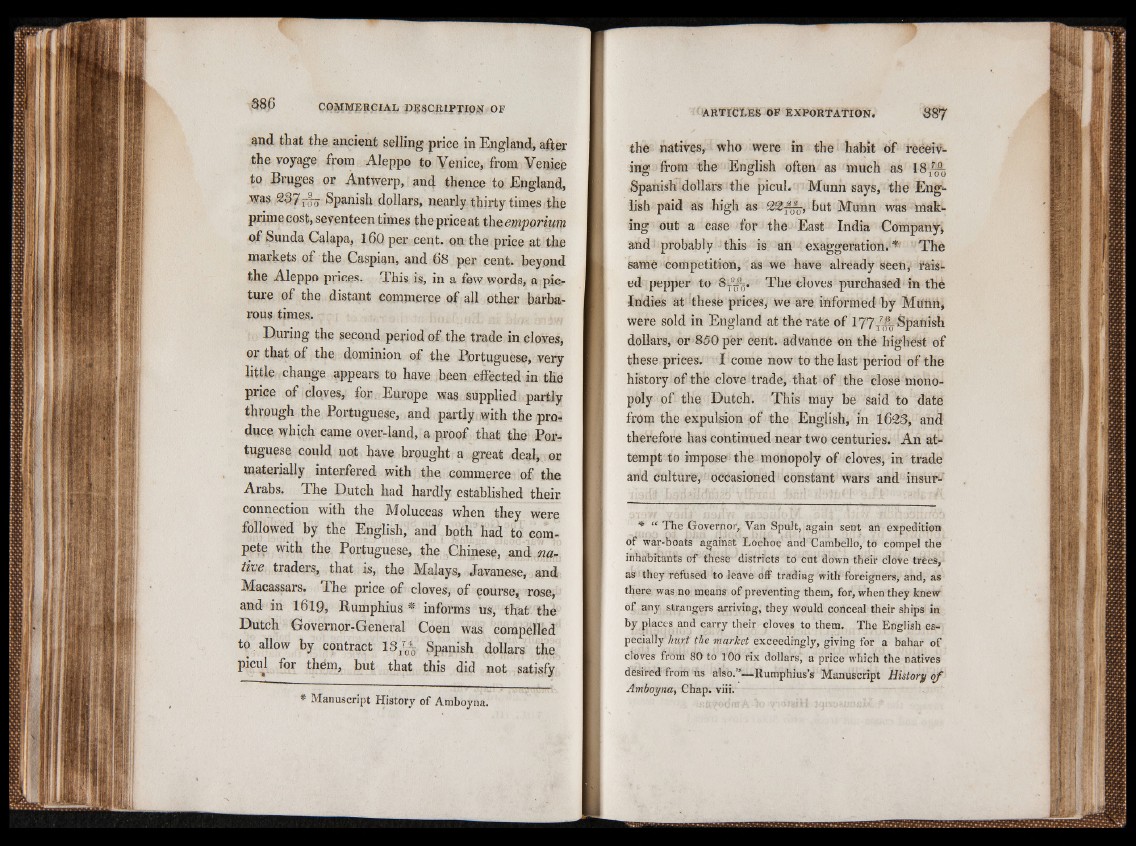
g,nd that the ancient selling price in England, after
the voyage from Aleppo to Venice, from Venice
to Bruges or Antwerp, and thence to England,
was 287rlo Spanish dollars, nearly thirty times the
prime cost, seyenteen times the price at the eynporiioji
of Sunda Calapa, 16Q per cent, on the price at the
markets of the Caspian, and 68 per cent, beyond
the Aleppo prices. This is, in a few words, a picture
of the distant commerce of all other barbarous
times.
During the second period of the trade in cloves,
or that of the dominion of the Portuguese, very
little change appears to have been effected in the
price of cloves, for Europe was supplied partly
through the Portuguese, and partly with the pro?
duce which came over-land, a proof that the Portuguese
could not have brought a great deal, or
materially interfered with the commerce of the
Arabs. The Dutch had hardly established their
connection with the Moluccas when they were
followed by the English, and both had to compete
with the Portuguese, the Chinese, and native
traders, that is, the Malays, Javanese, and
Macassars. The price of cloves, of course, rose,
and in 1619, Rumphius * informs us, that the
Dutch Governor-General Coen was. compelled
to allow by contract l | | g Spanish dollars the
picul for them, but that this did not satisfy
* Manuscript History of Ainboyna.
the natives, who were in the habit of receiving
from the English often as much as
Spanish dollars the picul. Munh says, the English
paid as high as but Munn was making
out a case for the East India Company*
and probably this is an exaggeration. * The
same competition, as we have already seen, raised
pepper to 8^ . The cloves purchased in thé
Indies at these prices, we are informed by Muriri,
were sold in England at the rate of 177/A Spanish
dollars, or 850 per cent, advance on the highest of
these prices. I come now to the last period of the
history of the clove trade, that of the close monopoly
of the Dutch. This may be said to date
from the expulsion of the English, in 1623, and
therefore has continued near two centuries. An attempt
to impose the monopoly of cloves, in trade
and culture, occasioned constant Wars and insur*
“ The Governor, Van Spult, again sent an expedition
of war-boats against Loehoe and Cambello, to compel the
inhabitants of these districts to cut down their clove trees,
as they refused to leave off trading with foreigners, and, as
there was no means of preventing them, for, when they knew
of any strangers arriving, they would conceal their ships in
by places and carry their doves to them. The English especially
hurt the market exceedingly, giving for a bahar of
cloves from 80 to 100 rix dollars*, a price which the natives
desired from us also.”—Rumphius’s Manuscript History of
Amboy na, Chap. viii.